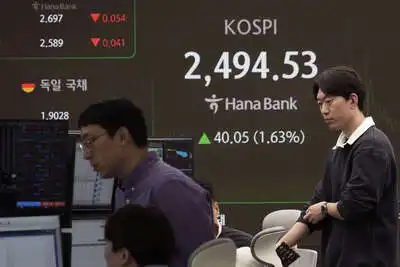had a cautious open Tuesday as investors awaited fresh that may define the appetite for .
The MSCI Asia Pacific Index opened flat with marginal declines in Japan and South Korea. The edged down in early Asian trade with a gauge of the greenback’s strength hovering near its lowest level in almost two years on weak demand for US assets. The yield on the 10-year US Treasury fell two basis points while yields on Japan’s sovereign slumped ahead of a bond auction.
Contracts for the S&P 500 and Nasdaq 100 jumped over 1%, holding their gains from a Monday holiday, after the European Union agreed to accelerate trade negotiations with the US. Markets were closed in the US for a holiday Monday.
Tariff headlines are once again dominating the market and investors are closely watching how President Donald Trump’s administration is dealing with Japan and India after talks with China earlier this month boosted optimism. Trade tensions and concerns of US fiscal position has weakened demand for US assets and are showing up the most in the dollar.
“Any further could inject more volatility into currency markets and pull the dollar down,” Kristina Clifton, a senior economist and currency strategist at Commonwealth Bank of Australia wrote in note.
Bloomberg’s dollar spot index was track for its lowest close since July 2023, while the greenback is at or approaching key levels against a host of currencies including the euro, British pound, yen and Swiss franc.
In Japan, yields on Japanese super-long bonds fell ahead of an auction Wednesday that is expected to test demand following a recent sale that sent jitters through global markets.
Yields on 40-year and 30-year maturities slid 10 basis points in Tokyo on Tuesday, adding to drops in recent days. These moves followed sharp gains in yields to record highs last week.
Elsewhere, China’s central bank asked its major lenders to raise the share of yuan when facilitating cross-border trade, in its latest push for the use of the currency as the world grapples with the onslaught of tariffs by the US. Trump’s plan to bring more factories back to the US has President Xi Jinping’s government also considering options to boost production of high-end technological goods.
There will be close attention on the nation’s electric vehicle sector, after BYD Co. introduced sweeping price cuts. Shares of China’s No. 1 selling car brand tumbled 8.6% in Hong Kong on Monday, sending shares of peers Li Auto Inc., Great Wall Motor Co. and Geely Automobile Holdings Ltd. also down amid investor concern about intensifying competition in the sector.
